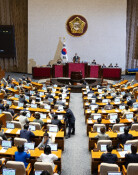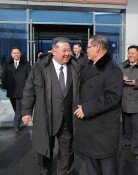[Editorial] Inappropriate Time To Talk About American Forces Pullout
[Editorial] Inappropriate Time To Talk About American Forces Pullout
Posted March. 19, 2003 22:28,
It is shocking that a senior U.S. official at the Pentagon said recently that If Koreans don`t want the presence of U.S. troops stationed in South Korea, we will leave the country right away, even tomorrow.
There has never been such a more straightforward remark demonstrating strained ties between South Korea and the U.S. before. It is inappropriate for the U.S. side to make such a sensitive remark at a time when strengthening the two nations` military alliance is more important than ever before to wisely address the North Korean nuclear threat.
Truly, it seems that South Koreans themselves invited such a reaction from the U.S. in many respects. Since last year, Koreans` growing anti-American sentiment which appeared during the last presidential elections and in the on-going candlelight vigils and a series of unfriendly remarks made by President Roh`s new high-ranking officials seem to have forced the U.S. to respond in such a way.
In some ways, the Korean government is greatly responsible for letting its relationship with the U.S. decline to the point that the U.S. is seriously considering the reallocation of U.S. troops in South Korea regardless of our genuine intentions. However, it is also undesirable for the U.S. to have made such a remark. The issue concerning the 37,000 American troops stationed in Korea is a sensitive one directly related to Korea`s national security. A majority of Koreans believe that the continuous presence of American troops on the Korean Peninsula is essential. In light of this, the senior American official`s remark that the U.S. will give up its role as a tripwire in case of North Korea`s invasion and relocate two American army divisions south of the Han River has caused grave concern over Korea`s national security. It is also likely that such a remark is inconsistent with the spirit of the two nations` military alliance and will further worsen bilateral relations by aggravating Koreans` anti-American sentiment.
Officials in both countries should be more cautious when they bring up the issue related to the presence of American troops in Korea. The U.S. should bear in mind that the realignment of U.S. troops in Korea is not something that can be hurriedly carried out by the U.S. alone because of difficulties in finding alternative sites for American troops and enormous relocation costs. It might be desirable for the U.S. to push ahead with such a plan step by step, taking the difficult and complex situation in Korea into consideration.
For the Korean government`s part, it should make vigorous efforts to ease public concern over possible U.S. military pullout from the country. As mentioned yesterday by Foreign Affairs and Trade Minister Yoon Young-kwan, echoing Prime Minister Goh Kun`s remark made early this month, it is urgent for the Korean government to persuade the U.S. to delay discussion of the realignment of its troops in Korea until the North Korean nuclear issue is resolved.







